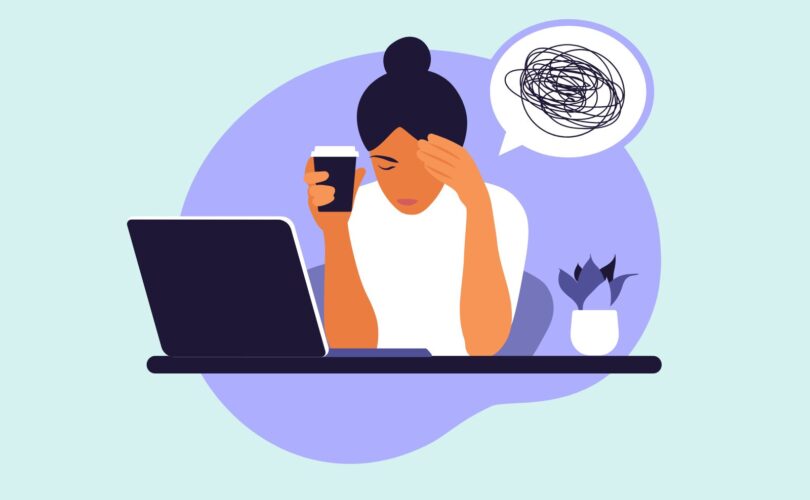No matter the profession you find yourself in, your work can be something of a whirlwind. Whether in the office or at home, an hour away or right down the street, during the day or even at night, work can be a pivotal point in your life.
Furthermore, our jobs are more complex than simply making money. It’s a symbol of responsibility: food on the table, your kid’s tuition, clothes on your back, airline tickets, and long-awaited vacations. For some, our jobs are even extensions of our passions, desires, identity, and purpose. With all this, it’s no surprise that the weight and importance of our work can cause some stress.
You may be wondering, so what? It’s not uncommon for people to feel overwhelmed or stressed out at work. For many, this is just a given. But did you know that work-related stress has a significant impact on the quality of your life, even your health?
In this post, we’ll explore what work-related stress is, how to recognize the signs, and what you can do to manage and reduce its effect on your life. So, buckle up and get ready to learn about work-related stress and the ways you can tackle it.
What Is Stress
To begin, let’s first get a high-level understanding of stress, so we can make sense of the impact it has on us. Simply put, stress is your body’s way of responding to any kind of demand or threat. When you feel threatened, your body’s “fight or flight” response kicks in.
Likely, you’ve heard of this response before. On the inside, this means that your body releases hormones, like adrenaline and cortisol, which help you react quickly to the situation. It’s why when we see a fleeting opportunity we act, or how we see a creepy spider and run.
According to the American Institute of Stress, stress can be both good and bad. Good stress, also called “eustress,” helps you stay focused and alert, like when you’re studying for a test or preparing for a big game. This kind of stress can help you do your best when it really matters.
On the other hand, bad stress, or “distress,” can happen when you feel overwhelmed or unable to cope with the demands that are placed on you. Too much bad stress can cause problems for your body and mind, like headaches, upset stomach, trouble sleeping, and feeling down or worried. We’ll look a bit deeper at this later.
Finally, it’s important to remember that everyone experiences stress, it’s a normal part of life, so you shouldn’t feel alone. The key is learning how to manage it so that it doesn’t get in the way of your happiness and well-being.
What Is Work-Related Stress
Now that we understand stress from a broader perspective, let’s zero in on the stress we experience from our jobs.
Work-related stress is a very common source of stress for people. We see this occur when the demands of your job become too much to handle or when you don’t have the resources or support needed to cope with these demands (American Psychological Association, 2021).
This type of stress can affect anyone, no matter what industry they work in or what their job title is. For some, work-related stress might even come from a loss of work, or an inability to find a job.
We’ll look a bit closer at some common causes of work-related stress in a little bit. Now that we have a better understanding of stress, we can tackle the issue head-on. Our ultimate goal should always be to manage our stress.
This will require a strategy, a plan of action that we can execute when we notice that stress is beginning to impact our life. But how do we know when stress has crossed that line? Let’s talk about some signs of stress that you can look out for.
10 Signs You Are Suffering From Work-Related Stress
Stress is not all in the mind. When we are under the weight of work-related stress, there is a domino effect that bleeds into our emotional, mental, and physical health. While this is unfortunate, it can thankfully be a sign that work stress is getting out of hand. So, here are some common signs that you might be suffering from work-related stress:
Constant Fatigue
When work-related stress starts affecting you, you might notice that you’re always feeling tired and drained, even if you’ve had enough sleep. This constant fatigue can make it harder for you to do your best at work or enjoy your free time, so it’s important to pay attention to how you’re feeling and take steps to manage your stress.
Trouble Concentrating
If you’re finding it hard to focus and concentrate on your tasks at work, it might be because work-related stress is getting in the way. This can lead to decreased productivity and increased frustration, making it important to find ways to cope with stress and regain your focus.
Increased Irritability
When work-related stress starts to build up, you might notice that you’re getting more irritable or emotional than usual. This can affect your relationships with coworkers, friends, and family, so it’s important to recognize this sign and find ways to manage your stress and improve your mood.
Physical Symptoms
Sometimes, work-related stress can cause physical symptoms like headaches, stomachaches, or muscle tension. If you’re experiencing these symptoms, it could be your body’s way of telling you that something is wrong and that you need to take steps to manage your stress levels.
Sleep Disturbances
If you’re having trouble falling asleep or staying asleep, or your sleep feels restless, work-related stress might be the culprit. A good night’s sleep is important for your overall well-being, so finding ways to manage stress and improve your sleep is essential.
Changes In Appetite
Work-related stress can also affect your appetite, leading you to eat too much, too little, or crave unhealthy foods. Paying attention to these changes and working on stress management can help you maintain a healthy eating routine.
Feelings Of Anxiety
If you’re constantly worried or anxious about your job, even when you’re not at work, it could be a sign that work-related stress is impacting your mental health. Learning ways to cope with stress and ease your anxiety is important for your well-being.
Decreased Job Satisfaction
Feeling unhappy or unfulfilled in your job might be a sign that work-related stress is affecting your overall satisfaction. If this is the case, finding ways to manage stress and improve your work experience is crucial.
Withdrawal From Social Activities
When work-related stress becomes too much, you might start avoiding social activities or spending time with friends and family. If this happens, it’s important to recognize that stress is impacting your personal life and take steps to find a better balance.
Increased Reliance On Unhealthy Coping Mechanisms
If you find yourself turning to substances like alcohol, nicotine, or caffeine to cope with work-related stress, it’s a sign that your stress levels are becoming unmanageable. It’s essential to find healthier ways to deal with stress and maintain your well-being.
The first step in managing your work-related stress is knowing the signs. Be vigilant and remember that this is for the sake of your health as well as your well-being. These stress signs look a lot like a bad day, but over time, you have to realize the depth of damage that stress can have on the simplest things.
Many people enter into a new job, starry-eyed and excited about the possibilities, only to let stress become the deciding factor of their optimism and potential. Understand the signs and keep a watchful eye, so you can begin to master your own fate.
7 Common Causes Of Work-Related Stress
The causes of work-related stress are many. They come in many forms and variations, but when we boil them all down, we can begin to see a recurrence of common themes. If you are experiencing the signs of stress, then looking at these common causes might be the best way to narrow down where your efforts ought to be going, in order to manage your stress. Each of these causes is an example to better relate to your own life. Take a look and see if any of these areas sound familiar to you:
High Workload And Unrealistic Expectations
According to the American Institute of Stress, unrealistic expectations and excessive workload are among the top causes of work-related stress. A high workload and unrealistic expectations from supervisors or coworkers can be a significant cause of work-related stress.
When you’re constantly expected to meet unattainable goals, it can lead to feelings of inadequacy and frustration. You might find yourself working long hours or sacrificing personal time to try to keep up with these demands, which can negatively impact your work-life balance and overall well-being.
For example, imagine you’re a teacher who is expected to create individualized lesson plans for every student while also managing a large classroom and participating in after-school activities. On paper, this may have sounded doable, but in practice, you find that the pressure to meet these expectations quickly becomes overwhelming and leads to increased stress levels.
Lack Of Control Or Autonomy In Your Job
A lack of control or autonomy in your job can also contribute to work-related stress. Research by Robert Karasek, a renowned job stress expert, indicates that jobs with high demands and low control are associated with the highest levels of stress (Karasek, 1979). When you don’t have the freedom to make decisions about how to do your work, it can create feelings of helplessness and frustration. This might be especially true if you’re constantly being micromanaged or if your ideas and opinions aren’t valued by your supervisors or coworkers.
For instance, imagine working in a customer service role where you’re required to follow a strict script for every call, regardless of the customer’s individual needs. This situation doesn’t leave much room for control or autonomy, which can, in the long term, become highly stressful and even demotivating.
Poor Work-Life Balance
A poor work-life balance can be a significant cause of work-related stress. When you’re constantly juggling the demands of work and personal life, it can be challenging to find time for self-care and relaxation. This imbalance can lead to feelings of burnout, fatigue, and decreased satisfaction in both your professional and personal life.
A working parent who is expected to work long hours and be available for meetings outside of regular business hours can often find it very difficult to balance job responsibilities with the needs of their family. This can lead to stressful time management and potentially even sacrifices that go against our purpose or drives.
Job Insecurity Or Uncertainty About Your Role
Job insecurity or uncertainty about your role can be another cause of work-related stress. When you’re unsure about the future of your job or unclear about your responsibilities, it can create anxiety, worry, and feelings of instability.
You might be working in a company that is undergoing restructuring or layoffs, leaving you unsure about the future of your position. This uncertainty can make it difficult to focus on your work and plan for the future. You might question the purpose of your efforts or make unhealthy time investments into the job out of fear.
Difficult Relationships With Coworkers Or Supervisors
Difficult relationships with coworkers or supervisors can be a significant source of work-related stress. Interpersonal conflicts, communication issues, and personality clashes can create tension in the workplace and make it difficult for you to feel comfortable and supported in your job.
For example, you might have a coworker who constantly undermines your ideas during meetings or a supervisor who provides unclear instructions and then criticizes your work. These challenging relationships can lead to increased stress and decreased job satisfaction.
Workplace Harassment Or Discrimination
Workplace harassment or discrimination can be another cause of work-related stress. Experiencing unfair treatment, bullying, or hostile behavior based on your race, gender, age, sexual orientation, or other factors can create a toxic work environment and significantly impact your mental and emotional well-being.
If you’re a woman in a male-dominated workplace, you might experience gender-based discrimination or harassment, such as being passed over for promotions or being subjected to inappropriate comments. There may be an unspoken sentiment that you should work harder, or “prove yourself.” This type of environment can be emotionally, mentally, and physically draining.
Poor Working Conditions Or Inadequate Resources
Poor working conditions or inadequate resources can also contribute to work-related stress. When you’re working in an environment that is noisy, overcrowded, or unsafe, or when you don’t have the necessary tools and resources to do your job effectively, it can be challenging to stay focused and productive.
Imagine working in a manufacturing facility with outdated equipment that frequently breaks down, causing delays and increasing the pressure to meet production deadlines. This type of situation can lead to increased stress and frustration.
As you can see, there are numerous causes of work-related stress, each with unique challenges and impacts.
What areas sound familiar to you? Sitting down with some paper and auditing your experience with work might be a good place to start finding your sources of stress. What events have transpired recently at work that lingers in your mind?
Sometimes these sources are quiet, like a consistent expectation to overperform, while others are loud, like being yelled at by a manager or making a public mistake. When you know your source, you can begin to make progress.
15 Consequences Of Unmanaged Work-Related Stress
So how big of a deal is work-related stress? Maybe this all sounds like a bit much, and you’re not quite convinced that “managing” your stress is really that important.
Unfortunately, stress is a very real force. While it may be “harmless” in the moment, long-term stress can be very destructive to our well-being. Here are 15 consequences of unmanaged work-related stress, as shown by experts in the field:
Decreased Productivity And Job Satisfaction
Work-related stress can lead to decreased productivity and job satisfaction. When you’re constantly feeling overwhelmed and under pressure, it’s difficult to perform at your best and enjoy your work.
For example, you might struggle to complete tasks on time, meet performance expectations, or feel motivated to take on new projects. According to a study by the American Psychological Association, employees experiencing high-stress levels report lower levels of job satisfaction and engagement (American Psychological Association, 2021).
Increased Risk Of Burnout
Chronic work stress can significantly increase your risk of burnout. Burnout is characterized by feelings of exhaustion, cynicism, and reduced professional efficacy, which can leave you feeling drained and detached from your job.
For instance, you might find yourself struggling to get out of bed in the morning or dread going to work each day. A Gallup study by Ben Wigert and Sangeeta Agrawal found that employees experiencing high levels of burnout are 63% more likely to take a sick day and 2.6 times more likely to be actively seeking a new job.
Difficulty Concentrating And Making Decisions
Work-related stress can negatively impact your cognitive functioning, making it difficult to concentrate and make decisions. For example, you might find it challenging to focus during meetings or struggle to make choices about project priorities. This can result in decreased efficiency and increased frustration, both for you and your colleagues.
Higher Likelihood Of Developing Anxiety Or Depression
Chronic work stress can increase your likelihood of developing mental health issues, such as anxiety or depression. When you’re constantly feeling overwhelmed or under pressure, it can take a toll on your emotional well-being, leaving you feeling anxious, irritable, or sad. For example, you might start to experience persistent worry about your job performance, even when you’re not at work.
Increased Risk Of Heart Disease And Other Health Problems
Work-related stress has been linked to an increased risk of heart disease and other health problems. A study published in The Lancet found that individuals with high-stress jobs had a 23% higher risk of heart attack than those with low-stress jobs (Kivimäki et al., 2012). Prolonged stress can also contribute to issues such as high blood pressure, diabetes, and obesity.
Strained Relationships With Coworkers And Loved Ones
Work-related stress can strain relationships with coworkers and loved ones. When you’re feeling stressed, you might be more irritable or emotional, which can lead to conflicts with colleagues or arguments with family members. For example, you might snap at a coworker who asks a simple question or take out your frustrations on your partner.
Poor Work-Life Balance
Chronic work stress can lead to a poor work-life balance, as you struggle to juggle the demands of your job and personal life. You might find yourself working long hours, sacrificing personal time, and neglecting your hobbies or social activities. This imbalance can result in feelings of burnout, fatigue, and decreased satisfaction in both your professional and personal life.
Difficulty Sleeping And Changes In Appetite
Work-related stress can disrupt your sleep patterns and cause changes in your appetite. You might experience difficulty falling asleep, staying asleep, or feeling rested after a night’s sleep due to persistent worry about work-related issues.
Additionally, stress can lead to overeating, undereating, or cravings for unhealthy foods. For example, you may find yourself reaching for sugary snacks to cope with stress or skipping meals due to a lack of time.
Weakened Immune System, Making You More Susceptible To Illness
Chronic work stress can weaken your immune system, making you more susceptible to illness. When you’re constantly under stress, your body produces stress hormones like cortisol, which can suppress your immune system and increase your risk of catching colds or other infections. For instance, you might find yourself getting sick more frequently during periods of high work stress.
Increased Risk Of Substance Abuse
Work-related stress can increase your risk of turning to substances like alcohol, nicotine, or caffeine as coping mechanisms. You might find yourself relying on these substances to help you relax or stay focused, which can lead to dependency and exacerbate your stress levels. For example, you might start drinking alcohol to unwind after a particularly stressful day at work or consume excessive amounts of caffeine to stay alert during long work hours.
Lowered Self-Esteem And Confidence
Chronic work stress can negatively impact your self-esteem and confidence. When you’re constantly feeling overwhelmed or under pressure, you might start to doubt your abilities and question your worth in the workplace. This can lead to feelings of insecurity and self-doubt, making it even more challenging to perform well in your job.
Higher Likelihood Of Making Mistakes At Work
Work-related stress can increase the likelihood of making mistakes at work. When you’re feeling stressed, it’s more challenging to concentrate and think clearly, which can lead to errors in judgment or lapses in attention. For example, you might accidentally send an email to the wrong person or overlook an important detail in a report.
Difficulty Coping With Change And Adapting To New Situations
Work-related stress can make it more difficult to cope with change and adapt to new situations. When you’re feeling overwhelmed, you might find it challenging to think flexibly or respond effectively to unexpected events or changes in your work environment. For example, you might struggle to adjust to a new software program or adapt to changes in your team structure.
Increased Absenteeism And Job Turnover
Chronic work stress can contribute to increased absenteeism and job turnover. When you’re experiencing high levels of stress, you might be more likely to take sick days or consider leaving your job in search of a less stressful environment. According to a study by the American Psychological Association, employees experiencing high-stress levels are more likely to be absent from work and have lower job retention rates (American Psychological Association, 2021).
Negative Impact On Overall Quality Of Life
Work-related stress can have a negative impact on your overall quality of life. When you’re constantly feeling stressed and overwhelmed by work, it can be difficult to enjoy your personal life and maintain a sense of well-being. For example, you might find yourself constantly worrying about work even during your time off, which can prevent you from fully engaging in hobbies, social activities, or time with your loved ones.
As you can see, the devastation of work-related stress is very real. Unmanaged, it can have numerous consequences on your life, from your physical and mental health to your relationships and overall well-being.
By recognizing the signs of work-related stress and implementing effective stress management techniques, you can mitigate these negative consequences and create a more balanced, fulfilling life both inside and outside of the workplace.
7 Benefits Of Managing Work-Related Stress
From the consequences alone we can see how influential work-related stress is. By managing these stress sources in our professional lives, we can benefit from the reprieve that it brings. Some of these benefits include:
Improved Mental Health And Well-Being
Managing work stress can lead to better mental health and overall well-being. When you’re able to handle stress effectively, you’re less likely to experience anxiety, depression, or burnout.
According to the American Psychological Association, employees who practice effective stress management report higher levels of job satisfaction and well-being (American Psychological Association, 2021). By learning and using stress management techniques, you can feel happier, more relaxed, and better equipped to handle daily challenges.
Enhanced Job Satisfaction And Performance
When you manage work-related stress, you’re more likely to enjoy your job and perform better. By prioritizing tasks, setting realistic goals, and taking breaks, you can stay focused and engaged in your work.
A study published in Frontiers in Psychology found that employees who effectively manage stress are more satisfied with their jobs and have higher job performance (Obrenovic et al., 2020). This means that when you handle stress well, you can feel more accomplished and satisfied in your career.
Improved Physical Health
Effectively managing work stress can lead to better physical health. Chronic stress has been linked to a variety of health issues, such as heart disease, high blood pressure, and diabetes.
A study published in the Journal of Occupational Health Psychology found that employees who practice stress management techniques have lower levels of stress-related physical symptoms (Bhui et al., 2016). By managing stress, you can reduce your risk of developing these health problems and maintain a healthier lifestyle.
Better Relationships With Coworkers And Loved Ones
Managing work stress can help improve your relationships with coworkers and loved ones. When you’re less stressed, you’re more likely to communicate effectively and maintain a positive attitude, which can lead to better interactions with others.
A study published in the Journal of Organizational Behavior found that employees who manage stress well have better relationships with their colleagues and supervisors (Sonnentag & Fritz, 2007). By handling stress effectively, you can create stronger connections and foster a more positive work environment.
Increased Productivity And Efficiency
Effectively managing work stress can lead to increased productivity and efficiency. When you’re less stressed, you’re more likely to stay focused and organized, which can help you accomplish tasks more quickly and accurately.
A study published in the Journal of Occupational and Environmental Medicine found that employees who manage stress well are more productive and have lower rates of absenteeism (Goh et al., 2015). By reducing stress, you can improve your work performance and contribute to your organization’s success.
Greater Resilience And Adaptability
Managing work stress can help you become more resilient and adaptable in the face of challenges. When you practice stress management techniques, you’re better equipped to handle unexpected changes and setbacks in your work environment.
A study published in the Journal of Occupational Health Psychology found that employees who manage stress effectively are more resilient and better able to cope with work-related challenges (Crane & Searle, 2016). By learning to manage stress, you can become more adaptable and better prepared to handle whatever comes your way.
Improved Work-Life Balance
When you manage work stress effectively, you’re more likely to achieve a healthy work-life balance. By setting boundaries for work hours, practicing self-care, and prioritizing personal time, you can reduce stress and create a more balanced, fulfilling life both inside and outside of the workplace.
A study found that employees who manage stress well have a better work-life balance and are more satisfied with their personal lives (Gragnano et al., 2020). By managing stress, you can enjoy a higher quality of life and find more satisfaction in both your work and personal pursuits.
These benefits are all available to you when you learn to manage your stress. Too often, people can adjust to the negative impact of stress in their life. You may not even notice how much of your well-being is currently being impacted. Take the proper steps and you’ll be amazed at how much your life can really improve.
15 Effective Stress Management Techniques For Work Related Stress
Now it’s time to take control. You know the signs, the symptoms, the causes, and the consequences. If you want the benefits, you’ll have to do some work. Thankfully, there are plenty of tried-and-true methods that you can begin using today. Here are 15 effective techniques to help you keep stress under control:
Take Regular Breaks
Give yourself short breaks throughout the day to recharge and refocus. Stepping away from your work for a few minutes can help you feel refreshed and more productive.
Practice Deep Breathing
When you feel stressed, take a few deep breaths. Inhale slowly through your nose, then exhale through your mouth. This simple technique can help you calm down and regain focus.
Prioritize And Set Realistic Goals
Break down your tasks into smaller, manageable steps and prioritize them based on importance. This way, you can accomplish tasks one by one without feeling overwhelmed.
Delegate Tasks
Share responsibilities with your colleagues when possible. Delegating tasks can help lighten your workload and reduce your stress levels.
Create A Positive Work Environment
Customize your workspace with items that make you happy or calm, like plants, photos, or inspiring quotes. A positive environment can help boost your mood and productivity.
Exercise Regularly
Physical activity releases endorphins, which help improve your mood and reduce stress. Aim for at least 30 minutes of exercise most days of the week.
Establish A Healthy Work-Life Balance
Set boundaries for work hours and make time for hobbies, social activities, and relaxation. Maintaining a balance can help you feel more fulfilled and less stressed.
Develop Strong Time Management Skills
Plan your day effectively by using tools like calendars, to-do lists, and reminders. Good time management can help you stay organized and reduce stress.
Connect With Supportive Colleagues
Build a network of coworkers who can offer support, encouragement, and advice. Sharing your struggles and successes can help you feel less alone in dealing with work stress.
Practice Mindfulness
Engage in mindfulness techniques, like meditation or yoga, to help you stay grounded, focused, and present in the moment.
Seek Professional Help If Needed
If your stress feels unmanageable, consider speaking with a mental health professional who can provide guidance and support.
Learn To Say No
Set boundaries by knowing your limits and saying no to additional responsibilities when you’re already feeling overwhelmed.
Use Relaxation Techniques
Try progressive muscle relaxation, guided imagery, or other relaxation techniques to help you unwind and manage stress.
Maintain A Healthy Diet
Eat nutritious meals and snacks to fuel your body and mind. A balanced diet can help you feel more energized and better equipped to handle stress.
Get Enough Sleep
Aim for 7-9 hours of sleep each night to help your body and mind recharge. Proper sleep can improve your mood, focus, and overall well-being.
When To See A Professional
Sometimes, stress can become too much to handle on your own. It’s important to know when to ask for help.
According to the American Psychological Association, you should consider seeing an expert or professional if you’re experiencing any of these signs (American Psychological Association, 2021):
- Feeling overwhelmed and unable to cope
- Having trouble sleeping or changes in appetite
- Feeling down, worried, or irritable for a long time
- Experiencing physical symptoms like headaches or stomach aches
If stress is getting in the way of your daily life in a big way, it’s a good idea to talk to someone who can help. There are many resources available to you. Here are a few places to start:
Your Doctor
Your primary care doctor can help you figure out if your stress is causing any health problems. They might suggest ways to manage stress or recommend a mental health professional for more support.
A Therapist Or Counselor
These professionals can teach you skills to help you manage stress and work through any feelings or issues that might be causing it.
Employee Assistance Program (EAP)
If you have a job, your employer might offer an EAP. These programs provide free, confidential support for employees who need help with personal or work-related issues, like stress.
National Helplines
If you need someone to talk to right away, there are helplines available, like the National Suicide Prevention Lifeline (1-800-273-TALK) or the Crisis Text Line (text HELLO to 741741). They offer free, confidential support 24/7.
Remember, asking for help is a sign of strength, not weakness. By seeking support from professionals, you’re taking an important step towards feeling better and managing stress.
Final Thoughts
Work-related stress is a common issue that many people face, but it’s essential to recognize the signs and take action to manage it effectively.
By understanding the causes and consequences of work-related stress and implementing some of the stress management techniques discussed, you can improve your overall well-being and create a healthier, more balanced work environment.
Remember, it’s never too late to start taking care of yourself and prioritizing your mental and physical health.

References
- American Psychological Association. (2021). Stress: The Different Kinds of Stress. Retrieved from https://www.apa.org/topics/stress/different-kinds
- Gragnano, A., Simbula, S., & Miglioretti, M. (2020). Work-Life Balance: Weighing the Importance of Work-Family and Work-Health Balance. International journal of environmental research and public health, 17(3), 907. https://doi.org/10.3390/ijerph17030907
- Bhui, K., Dinos, S., Galant-Miecznikowska, M., de Jongh, B., & Stansfeld, S. (2016). Perceptions of work stress causes and effective interventions in employees working in public, private and non-governmental organizations: a qualitative study. BJPsych bulletin, 40(6), 318–325. https://doi.org/10.1192/pb.bp.115.050823
- Kivimäki, M., Nyberg, S. T., Batty, G. D., Fransson, E. I., Heikkilä, K., Alfredsson, L., Bjorner, J. B., Borritz, M., Burr, H., Casini, A., Clays, E., De Bacquer, D., Dragano, N., Ferrie, J. E., Geuskens, G. A., Goldberg, M., Hamer, M., Hooftman, W. E., Houtman, I. L., Joensuu, M., … IPD-Work Consortium (2012). Job strain as a risk factor for coronary heart disease: a collaborative meta-analysis of individual participant data. Lancet (London, England), 380(9852), 1491–1497. https://doi.org/10.1016/S0140-6736(12)60994-5
- Obrenovic, B., Jianguo, D., Khudaykulov, A., & Khan, M. A. S. (2020). Work-Family Conflict Impact on Psychological Safety and Psychological Well-Being: A Job Performance Model. Frontiers in psychology, 11, 475. https://doi.org/10.3389/fpsyg.2020.00475







